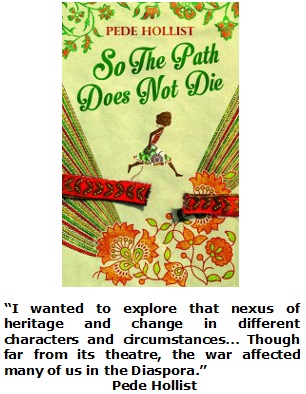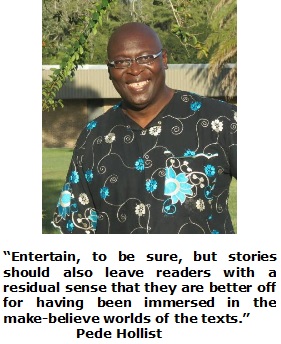 ReConnect Africa is a unique website and online magazine for the African professional in the Diaspora. Packed with
essential information about careers, business and jobs, ReConnect Africa keeps you connected to the best of Africa.
ReConnect Africa is a unique website and online magazine for the African professional in the Diaspora. Packed with
essential information about careers, business and jobs, ReConnect Africa keeps you connected to the best of Africa.



 Sierra Leonean novelist Pede Hollist talks about the themes behind his acclaimed novel, So the Path Does not Die, which follows the story of Finaba Marah from her native Sierra Leone to the United States
Sierra Leonean novelist Pede Hollist talks about the themes behind his acclaimed novel, So the Path Does not Die, which follows the story of Finaba Marah from her native Sierra Leone to the United States
So the Path Does Not Die is a tender and insightful novel by Pede Hollist, a native of Sierra Leone now resident in the USA. The book is a touching coming-of-age story which follows Finaba Marah through her childhood and adolescence into adulthood and from her native Sierra Leone to the new and exciting land of opportunity, the USA.
A very modern story, So the Path Does Not Die addresses issues of ethnicity, sexuality and gender, exploring attitudes towards female circumcision, identity and belonging through the life of a feisty, young African woman as she makes her way through the world, balancing the weights of tradition and modernity. At times funny, at times sad, So the Path Does Not Die is, most of all, a story of survival.
ReConnect Africa spoke to the exceptionally talented, Caine Prize shortlisted writer Pede Hollist about his motivation for writing and how his experiences shaped Fina’s story and his own career path.
ReConnect Africa: Can you tell us a little about you and your background?
Pede Hollist: I am a teacher of African and World literature but a lover of stories, oral and written. Give me a book to read or tell me an interesting story in any genre from any part of the world, and I will lap it up, although, if you press me, I like narratives involving characters on a quest. Spice it with science and the unbelievable, and you have me hooked.
I grew up reading the novels of Englishmen Richard Gordon and P.G. Wodehouse, so humour, I think, is my default narrative style, but I also read the detective novels of James Hadley Chase. I imagine intrigue and mystery trickle into my writing.
Though as a youngster I had ambitions to write, and scribbled a few lines here and there, I pursued football, cricket, and track and field in my teens and early twenties, maintaining a tangential connection to the creative arts through acting in high school, college, and after, with a semi-professional group.
My next foray into the creative came much later in the early nineties. As part of a first-year composition course I taught Maxine Kong Kingston’s The Woman Warrior. Critics described it as providing another slice of America’s immigrant mosaic. At the time, I did not know of anyone who had written about the 20th century African experience of coming to America. It seemed lost in the broader African-American experience of slavery, Jim Crow, and civil rights. So the Path Shall Not Die started as an attempt to fill that gap, to provide yet another slice of the American mosaic.
ReConnect Africa: What inspired Fina’s story in So the Path Does Not Die?
Pede Hollist: Multiple concerns and interests, but the three main ones are as follows. About the same time as I read Woman Warrior, I had also read Alhassan Mansaray’s A Haunting Heritage and, a few years later, Hannah Khoury’s So Pretty an African. Both write grippingly about the Sierra Leone immigrant’s experience in the U.S.—the latter about three women striving to reconfigure their lives in the new land and the former about a young man whose cultural heritage haunts and eventually derails his new life.
Multiple concerns and interests, but the three main ones are as follows. About the same time as I read Woman Warrior, I had also read Alhassan Mansaray’s A Haunting Heritage and, a few years later, Hannah Khoury’s So Pretty an African. Both write grippingly about the Sierra Leone immigrant’s experience in the U.S.—the latter about three women striving to reconfigure their lives in the new land and the former about a young man whose cultural heritage haunts and eventually derails his new life.
I wanted to explore that nexus of heritage and change in different characters and circumstances. As these ideas percolated and multiple early drafts retired to desk drawers and floppy disks, civil wars engulfed Liberia and Sierra Leone.
Though far from its theatre, the war affected many of us in the Diaspora. I wanted to chronicle some of those affects. Also, then and now, I believe Africa’s future is inextricably tied to how well it harnesses its human capital, in and out of the continent, in the concerted effort of home-grown, sustainable development. Fina’s story and the path she pursues provide literary responses to these three concerns.
ReConnect Africa: As a man telling a story through the eyes of a woman, were there any challenges that you encountered in getting the ‘voice’ right?
Pede Hollist: No more than I would have encountered depicting a character that is white, European, English, or Zulu. In other words, someone who is everything I am not. As a male writer, I was mildly aware my narrator should not sound paternal or stereotypical, but beyond that, I focused more on making sure the actions and reactions of all the characters made emotional and psychological sense within the constraints of their personalities, socio-cultural, economic, and educational circumstances of the novel’s world.
Of course, if characters were simply logical they would be boring, so one has to include impulsive, irrational and unexpected behavior to make them real. Ultimately though, character voice is a product of one’s range of real and vicarious encounters with people. I doubt one can write a “strong” woman, sympathetic white man, blithering idiot, or sadistic racist without “interacting’’ with one of these types.
“The moving-to-America story involves common experiences or stages: each provides opportunities to explore and raise questions about home and abroad, identity, otherness and host of other themes and issues.”
ReConnect Africa: The book follows Fina’s journey from Sierra Leone to America. How much did your own experience of moving to America impact the ideas you explore in the novel?
Pede Hollist: The moving-to-America story involves common experiences or stages: (1) socio-economic and/or cultural realities of the native land—many times depicted as oppressive and hostile but sometimes as idyllic; (2) desire to escape the native land, get higher education, or pursue economic opportunity and prosperity; (3) visa problems and other obstacles before departure; (4) the journey itself; (5) euphoria of arrival (6) realities and/or disillusionment of (re)settlement and assimilation; (7) nostalgia for home; (8) assimilation in the new homeland or return to the native land.
I lay no special claim to these elements, and, of course, they are not discrete or sequential. Each provides opportunities to explore and raise questions about home and abroad, identity, otherness and hosts of other themes and issues. I am sure my experiences influenced how these ideas and questions are organized, raised, dissected, and resolved. However, through the story’s characters and events, my experiences become diffused, reformatted, enlarged, and/or repacked as Fina’s journey to America.
ReConnect Africa: How do you combine being a novelist with your work as an academic, and does one in any way limit the other?
Pede Hollist: They influence each other, but in mutually beneficial ways. The academic in me desires to make my text mean, sometimes to provide ambiguity and complexity; to be literary, so to speak. However, becoming preoccupied with meaning and craft can easily lead to preachy texts that neglect to be engaging stories. Specifically, I struggle with language, and with defaulting to academic discourse in place of sensory language. Not being aware that a story must in some way enlarge the reader, “fatten” him up after his encounter with the world of the text, is, I think, to miss the point of even telling stories.
Entertain, to be sure, but stories should also leave readers with a residual sense that they are better off for having been immersed in the make-believe worlds of the texts. After I finished reading Toni Morrison’s Song of Solomon, I remember sighing, impressed by its broad sweep and depth, by a sense that I have been entertained but, more importantly, enlarged. That’s how I want readers to feel after they have read my stories. I have a long way to go, but I am working on it.
ReConnect Africa: So the Path Does Not Die is your first novel, although you have written short stories, including one that was shortlisted for the prestigious Caine Prize. Do you see novels as your focus for the future?
Pede Hollist: I am not sure. I am going to pursue both to the extent that time allows. I don’t think they are mutually exclusive.
ReConnect Africa: Where can our readers buy a copy of the book?
Pede Hollist: For online purchases: U.S. and Africa www.amazon.com and http://www.africanbookscollective.com/
U.K., Europe, and non-African Commonwealth: www.amazon.co.uk and http://www.jacarandabooksartmusic.co.uk/
